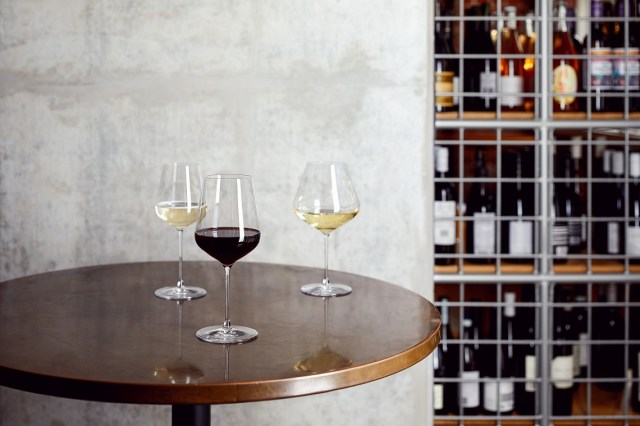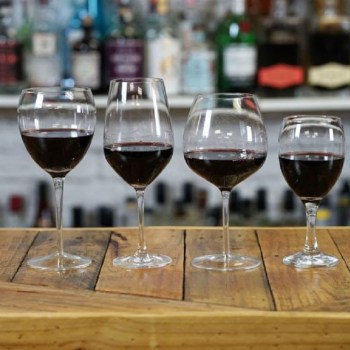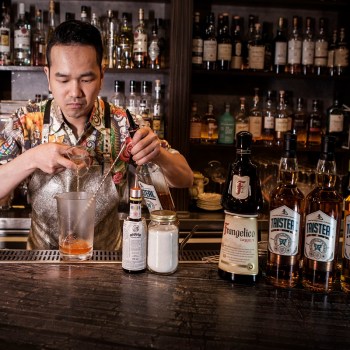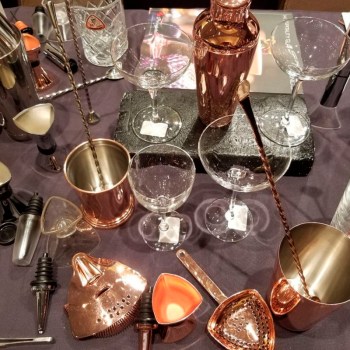What comes to mind when you think about your own best experience with wine? Maybe you’re swirling an incredible vintage in a winery. Perhaps you’re raising your bubbly in celebration at a restaurant.
Wherever this memory takes you, odds are the wine is coming in a good quality glass. My favourite wine memory certainly wouldn’t have happened in the scratched plastic vessels I had as a student.
Often it’s likely that customers won’t actively recognise the glassware, nor identify whether it is particularly good or bad. But after every glass or bottle, every interaction with a venue, that customer will go away with an overall impression, built from all the little aspects of their experience.
For Bar Liberty, finalist in the Best Wine List category at the Australian Liquor Industry Awards for 2019, the glass is one of those little aspects that impacts a customer’s experience.
“I think it’s just another extension of the décor, music, food and wine offering,” said Bar Manager, Josh Begbie.
“Some places are just better at attention to detail and nice functional glassware fits in that category.”
Let’s face it; the average consumer isn’t going to choose a venue based solely on their glassware selection. But it will impact their experience while they are there, potentially influencing whether they order more, whether they come back, or whether they tell their friends. Poor glassware could be holding you back.
Australian glassware producer Plumm recognised this as an issue when they began in Melbourne 10 years ago.
“We’re not all wine nerds. The everyday person doesn’t necessarily know all the ins and outs of winemaking. They just want to really enjoy their wine and want to go on a simple journey,” said Dora Constantinou, General Manager at Plumm.
“We’re about wine glasses and enhancing the everyday wine drinking experience. We want you to come on the journey and appreciate the wine, but also appreciate the glass when it delivers that experience.”

Stemming from a company that makes wine, Plumm began with a range influenced and inspired by winemakers. They have just released a sommelier inspired series called Plumm Three; a pared back line of just three glasses that’s available to buy now.
Matt Herod, Executive Sommelier at Altitude Restaurant in Sydney’s Shangri-La Hotel, was one of the sommeliers that contributed to the design process of the range, which they now use in house. Herod said that it’s more important than ever to focus on the finer details, because that’s what consumers are doing all the more often.
“There’s a lot of trends in the market that’s forcing us to pay more attention to what we consume, and not only the food and wine coming out,” Herod explained at an unveiling of the new range.
“We’re asking more questions. For example, we want to know who made the wine, how it’s been made, where it’s been made… we want to know more details before we actually enjoy it, and we are more aware of our choices.”
With the ever present trend of premiumisation, consumers are looking for higher quality products that produce exceptional experiences. It makes sense to serve these premium products in premium vessels.
At Bar Liberty, they know that customers do recognise the difference, even if they can’t point to the specific design cue that makes glassware higher quality.
“You can instantly tell when picking up a nice piece of stemware, that someone has put some love and care in deciding which glass their venue uses,” Begbie said.
“I’ve had some amazing experiences drinking wine out of latte cups in countryside Italian trattorias…not sure people would be happy drinking Premier Cru Burgundy out of those though.”
International glassware producer Riedel agrees with Begbie that consumers aren’t looking for one thing in particular when it comes to glassware, they’re just looking for everything to come together seamlessly.
“The reality is, while the consumers don’t necessarily think about it, the more attention to detail when it comes to this equation, the better the wine will be,” said Riedel Managing Director in Australia, Mark Baulderstone.
“A glass of wine is something that should deliver an enjoyable fun experience that only the wine in the right glass will deliver at its maximum.”

The great shape debate
There’s a fair consensus among wine experts that the quality of glassware is important to enhance the overall experience of the wine consumer, on- and off-premise. But there’s another aspect of a glass that tends to split opinion, and that’s the shape.
The great shape debate is basically separated into three camps; those that believe the shape matters per varietal, those that believe the shape matters per wine style, and those that don’t think the shape is that important.
Riedel belong to the first camp, evident from their range which includes specific glasswares for wine varietals, spirits, beers and even cocktails.
Baulderstone said this philosophy began in the 1970s by Clause Riedel, the ninth generation of the family owned company.
He said that Clause: “essentially made the discovery and the correlation that shape and size determines how you perceive the wine in the initial stages. This is something which was just a very surface level which he didn’t really understand.
“It wasn’t till some years later with a lot of research that we really came to understand that every different variety has its own unique DNA, every different variety of wine, and to best showcase that you’re able to match a glass to the individual style of the wine. Therefore, if you put wine of a certain variety in the wrong glass, it won’t necessarily highlight the right components of that wine.”
Plumm on the other hand, believe it’s simpler than that. Like Riedel, their designs have input from a variety of wine experts around the world to make different shapes and sizes for specific wines. However, they believe that varietals can share similarities, allowing them to use the same glass.
“We worked with our winemakers from all over the world and asked them the question, ‘what do you look for in a glass to make your varietal shine?’ What we came up with was you actually don’t need a glass for every varietal of wine, rather a glass to suit wine styles,” said Constantinou.
“When we talk about wine styles versus wine varietals, it’s really about simplification, and that’s our philosophy. We’re all about simplicity, elegance and durability.”

The final idea in the industry surrounds whether there is a need for different shapes and sizes at all, and it’s an opinion that is particularly common from venues that don’t have the luxury of storage space for endless ranges of glassware.
Bar Liberty have this storage issue and so use the universal ‘StandArt’ glass by Gabriel-Glas from Austria because of the versatility.
“There’s a school of thought that certain varieties are suited to particular shapes, but I think good quality and good company supersede all that,” said Begbie.
But Baulderstone said that a lack of space still gives you the option to hold a range of glasses.
“Unfortunately when you’re restricted by storage you have to standardise to some degree,” he said. “But it’s just common sense stuff, knowing what’s on your list and then choosing some glasses accordingly is the right way to go.”
On this point, Plumm agrees that there needs to be balance in the glassware that specifically caters to the needs of a venue.
“Balance is about performance and making sure that you have this gorgeous looking glass that also delivers the quality of wine that you want to experience,” said Constantinou.
Herod said the right glass will make “a perfect synergy between back of the house and front of the house.”
“You want the glass to be invisible, you don’t want the glass to come in the way of you properly experiencing the drink.”
Considering all the sides of story, one thing remains clear – glassware is important, and impacts customer experiences at your venue. It’s definitely worth investing time to make sure your wine glasses are reaching their full potential.



